A bridge too far
For future reference: This post relates to the 2023 Aboriginal and Torres Strait Islander Voice Referendum
WARNING: Yes supporters: if you are still smarting from the referendum loss you may not enjoy this article. It's an introspective look at my own appreciation of the affair, hopefully detailing why I was ultimately unable to support the proposal.
TL;DR: The Voice Referendum failed. It was a deserved result. The methodology used to create it was puzzlingly exclusive, and the resultant ask unreasonable. Although the Yes campaign was passionately (if inexpertly) executed, it was based on flawed principles. Here I reflect on my own appreciation of this doomed initiative.
A cheerless result

The televised coverage of polling results on October 14 2023 was a fizzer.
Over before it began.
I had an early run planned the following morning. My aim of being in bed by 8pm was never really in danger.
The long faces on the ABC panel at the completion of Dean Parkin's concession speech signaled an end to both the referendum, and my night.
🧍🏼♂️🧍🏻♂️🧍♂️🧍🏽♂️🧍🏾♂️🧍🏿♂️
Opportunities lost
I'm not going to presume to understand how indigenous people are reacting to this vote. If the well-meant platitudes and expressions of support coming from the remainder of the community are falling on deaf ears I don't suppose I would be too surprised.
For me there lingers only impotent frustration. For a brief hopeful moment there was a window of opportunity. Good was possible. The opening was slammed shut, not by the citizens who voted against the Voice, but by the actions of the very people who most desired it to succeed. Noble intent and herculean efforts were subverted by questionable choices, amateurish mistakes, self-sabotaging overreach, and foolish misjudgments.
I'm writing down my thoughts because I don't see my views reflected in the media. The "reporting" I see has mainly been thinly disguised emotional pitches for one position or another. Too often there has been a barrier of political and social correctness standing between the issues and a platonic measurement of them.
I won't write about the No camp. As previously indicated, I'm not interested in that topic. They played no active role in my considerations. I saw plenty of their material but, ironically, this was mostly due to the fact that the Yes camp spent so much time obsessing over it.
My vote in this referendum hinged solely on the arguments and actions of 'Yes' proponents. I never felt the need to enlist a third party to add negative interpretations.

In his concession speech Parkin (speaking to No voters) said: "We were not able to reach you and cut through what has been the single largest misinformation campaign that this country has ever seen".
It was a moment that provoked jeers and cheers amongst the attendant throng of campaign supporters.
For me it also struck a chord. One of disconnection, deflection, and fantasy.
Dean, you were able to reach me fine. Your arguments were simply not good enough.
🧍🏼♂️🧍🏻♂️🧍♂️🧍🏽♂️🧍🏾♂️🧍🏿♂️
A trek towards failure

The seeds of self-destruction for this campaign were sown at the outset. The publication of the Uluru Statement From The Heart. If you have read my critique of it, you will know that the USFTH is a document I both loathe and adore.
A container of uncomfortable tensions. Trying to be simple and accessible, while also representing deep and complicated grievances. Demanding change, while at the same time desperate to avoid testing the good-will of the intended recipients. The result is both a success and a failure. A success because it undeniably catalyzed the referendum. A failure because it locked its authors and supporters into a methodology and narrative that was ultimately doomed to failure.
The methods and tactical thinking that emerged included the following:
- Be unconventional. Take every rejection, pretend it is acceptance, and forge forward.
- Stay away from detail. Use emotional spin and expect people to respond positively.
- Politicians can be out-smarted, and out-maneuvered.
- Don't allow uncomfortable facts and inconsistencies to alter the chosen course.
- Be assertive. If that means bullying and shaming opponents, then so be it.
🧍🏼♂️🧍🏻♂️🧍♂️🧍🏽♂️🧍🏾♂️🧍🏿♂️
Inexplicable oversight
Another harbinger of campaign failure was also already present in 2017.
The architects of the Voice made much of their comprehensive first-peoples consultation. Time and again we were to hear of the virtual unanimity of support within the indigenous community for the Voice.
This was a critical prerequisite for success, but it was far from sufficient.
It is incomprehensible that a campaign that so laudably and expertly focused on grass roots indigenous engagement somehow completely ignored the other 96-97% of the population.
The attitude seemed to be "Well, you've asked us what is needed to fix our problems. We've decided, so now you must give it to us".
Sans discussion and negotiation, the (predictable) response was "Thanks, but that's not reasonable".
The USFTH should have signaled the start of a much broader community consultation. One that would have (at best) resulted in a different and more generally palatable proposal. At worst, it may have caused the entire initiative to be shelved. A gamble for sure. But, at least one with a chance of success.
🧍🏼♂️🧍🏻♂️🧍♂️🧍🏽♂️🧍🏾♂️🧍🏿♂️
Basic problems
The Voice proposal as presented was always going to be a hard sell: Institutionalizing special privilege for one group of Australians as determined solely by heritage.
Half a century of social conditioning has culminated in a national culture that, at least outwardly, disavows racism. Now, a certain type of racism was being sold as both acceptable and necessary.
The whiplash inducing mental gymnastics required were soon accompanied by insult. Questioning the apparent paradox resulted in either non-sensical explanations differentiating indigeneity and race, or blanket counter accusations of racism.
How did voter polls fall from 70% approval rating to just 40% in the 12 months leading up to the referendum? I think the reason is clear. When people knew little about the proposal, they heard:
"Would you approve a proposal to aid the indigenous peoples of Australia?"
As they engaged, they began to hear:
"Would you approve a proposal that might aid the indigenous peoples of Australia, but also might harm non-indigenous citizens?"
It is not surprising that the critical swing vote of centrists shifted as they began to focus on the issues.
The tragedy for the Yes campaign is that they failed on two key fronts.
- It was not unequivocally demonstrated that aboriginal outcomes would substantially improve.
- It was not established that the Voice would not actually make things worse for non-aboriginals.
🧍🏼♂️🧍🏻♂️🧍♂️🧍🏽♂️🧍🏾♂️🧍🏿♂️
Emotional manipulation
The architects of the Voice framed their campaign as a generous invitation. A message of love.
Superficially, this Kumbaya approach clashed vividly with the poisonous vitriol and sanctimonious mockery that were to become signature tools of certain Yes supporters.
More tellingly, it was a sentiment that was jarringly discontinuous with the vehemence with which it was pushed.
An invitation that cannot be refused is not an invitation. It is an order.
An expression of love that is transactional is not love. It is emotional abuse.
It was a strategy that reeked of cognitive dissonance, and psychological manipulation.
Ultimately it was most unkind to the high minded and good willed1 who faithfully took it to heart.
Had I been a supporter drinking the "generous invitation" kool-aid, the poll result would likely have seemed a callous slap in the face, a heartless repudiation of my generosity, love, and empathy. In this way it was negligently cruel to those most invested in it: its supporters.
🧍🏼♂️🧍🏻♂️🧍♂️🧍🏽♂️🧍🏾♂️🧍🏿♂️
Division
Albanese's "Simple, modest, unifying proposal" was anything but. It could have been. It should have been. It wasn't.
Had he termed it a "Convoluted, over-reaching, divisive proposal" he would have at least demonstrated some basic comprehension of reality.
Prior to this referendum I would have rather scratched out my own eyes than watch Sky News. The low-grade right-wing poison generated by the Murdock media normally has no place in my diet. Yet, during the campaign I would see statements and monologues from the likes of Andrew Bolt and think "you know what, the bloke's got a point..."
I'm angry about that. I'm angry that my vote has aligned with the vote of white supremacists and anti-aboriginal racists. I reject any argument that simplistically attempts to conflate these positions based on this collinearity.2 But the coincidence still angers me. I unashamedly blame the lack of a coherent, sensible, workable Yes proposal for this.
🧍🏼♂️🧍🏻♂️🧍♂️🧍🏽♂️🧍🏾♂️🧍🏿♂️
Disinformation and Misinformation
There was plenty of it. Both sides were guilty of it.
Your perception of its severity and impact likely depends on whether it supported your case or not.
All politics involve some manipulation of reality. The Australian voter knows this, and calibrates for it. At the extremes it normally hurts the source more than the intended target.
Blaming it for a loss, or crediting it for a win, serves only as an excuse to avoid the hard work of examining actual issues.
Too often I saw Yes campaigners engaging with opposing arguments. This both amplified those arguments, and reduced the time spent propagating 'Yes' messages.
If the No camp was more effective at "flooding the zone with shit"3, there was a simple reason for it. The Yes camp had munificently prepared the ground for them.
- Leave a massive vacuum regarding the details of the Voice.
- Fail to obtain bipartisan support.
- Allow spokespeople and supporters to become political.
- Have incoherent and poorly explained positions.
🧍🏼♂️🧍🏻♂️🧍♂️🧍🏽♂️🧍🏾♂️🧍🏿♂️
Celebrity Endorsements
Wayne Kawitha-Bighed says "Vote Yes!"
Ok.🙄 Good to know. 🤷🏼
❝You shouldn't speak until you know what you're talking about. That's why I get uncomfortable with interviews. Reporters ask me what I feel China should do about Tibet. Who cares what I think China should do? I'm a fucking actor! They hand me a script. I act. I'm here for entertainment. Basically, when you whittle everything away, I'm a grown man who puts on makeup.❞
- Brad Pitt.
It is a particularly rare breed of arrogance that expects citizens to cleave to an idea of national importance because some man or woman who runs around in makeup says they should.
I cannot think of a single instance in this debate where a celebrity offered a useful or enlightening explanation regarding any facet of the proposal. Not one.
Celebrities have platforms, and can amplify messages. Having some celebrity constantly beat you around the head and shoulders with a virtue-signaling baton is unlikely to convince you of anything. Nine times out of 10, the only reaction provoked is a dislike of that celebrity.
Craig Foster demonstrated one particularly foolish use of celebrity. He is the chair of the Australian Republic Movement. Every time I saw him speak, I could not help thinking, "Mate, if you tie yourself to a losing cause, and cause a substantial section of the population to dislike you in the process, how is that going to help when the discourse swings around to the issue of a Republic?"
🧍🏼♂️🧍🏻♂️🧍♂️🧍🏽♂️🧍🏾♂️🧍🏿♂️
Vitriol

I've covered this before. This was endemic in the Yes camp. It wasn't just spitting professors, self-righteous celebrities, and the host of social media trolls. It came from the top down. Pearson. Davis. Langton.
The thing about this that upset me most was how pointlessly self-defeating it was. It was almost as if they were fifth-columnists sabotaging their own cause. Crazy.
🧍🏼♂️🧍🏻♂️🧍♂️🧍🏽♂️🧍🏾♂️🧍🏿♂️
Trumpism
Somewhere along the line it became popular for Yes supporters to characterize their opponents as "Trumpists". I'm not really across the reasoning for this. I think it has to do with their belief that No proponents were "flooding the zone with shit" and creating "alternative facts". I think I also saw some suggestion that there were American political bodies behind certain aspects of the No case.
Yeah. Dunno. Seems farfetched to me. I don't think I saw anything from the No camp that was not matched by a similar situation in the Yes camp. No proponents were aggressively spreading FUD4, but does that come as any surprise? Yes supporters should rather ask why it was so effective, rather than calling foul on the tactic itself.
The single most Trumpist parallel I drew was the Poll denialism that seemed so oddly pervasive amongst Yes supporters.
🧍🏼♂️🧍🏻♂️🧍♂️🧍🏽♂️🧍🏾♂️🧍🏿♂️
The "Yes" people.

The figureheads and spokespeople of the Yes camp did not exactly cover themselves in glory during this campaign.
Mostly they seemed decent-enough people, but there were a couple that clearly should never have been allowed near a microphone.
On the whole I think it was a case of reasonable people desperately trying to justify an unreasonable proposal.
Were there winners and losers? I think so.
My childhood memories of Noel Pearson predispose me to thinking he is a good person. I want it to be so. I tried to ignore his emotional outbursts and the reports of his uncontrolled temper. His performances during this referendum were unworthy of him, and one suspects his time on the national stage is over.
Marcia Langton proved herself to be political kryptonite. A condescending activist and sanctimonious ideolog, her uncanny ability to stoke mainstream fears probably did more than any high-profile campaigner (other than Jacinta Nampijinpa Price) to undermine the Yes vote.
Anthony Albanese was both hero and villain. Hero because he at least had the gonads to go forward with the referendum. Villain due to his inept leadership on the issue. As the prime minister, the major political decisions must have been his. Fumbling these so outrageously will leave him with an indelible stain of incompetence.
Megan Davis is the most perplexing of the lot to me. Somewhere during the campaign, she just seemed to give up. The transformation from an authoritative voice of reason, to an aggrieved and spiteful combatant was hard to watch.
Dean Parkin was one of the few prominent Yes campaigners to emerge from the referendum with reputation enhanced. As far as I could tell he avoided controversy, only spoke in controlled circumstances, did not engage on social media, and tried to be as innocuous as possible. I found it kind of sad that I had seen so little of him during the campaign, yet at the death he stood alone to concede the defeat. Others who had been far more instrumental in the downfall were nowhere to be seen...
🧍🏼♂️🧍🏻♂️🧍♂️🧍🏽♂️🧍🏾♂️🧍🏿♂️
My vote.
I took a photo of my ballot. First time I have done that.
It seemed a more important vote than any I have cast before.
Carefully scribing the letters N and O gave me no pleasure.
Logically, it was the only option that could stem from a reasoned distillation of all that had been laid before me.
I've previously claimed to be an "average" Australian whose views would align with those of the majority. There is a quiet satisfaction in having this confirmed. It is marred by a sad frustration that people like me were clearly not deemed relevant by the architects of the Yes proposal. Had we been, we might now be celebrating the passing of more palatable and constructive measures.

🧍🏼♂️🧍🏻♂️🧍♂️🧍🏽♂️🧍🏾♂️🧍🏿♂️
Peter Sutton Jun 12, 2021 Good Weekend Talks. 4m12s.↩
(Hitler liked Wagner. I like Wagner. I don't think this makes me a Nazi).↩
The Steve Bannon quote regarding the weaponization of misinformation. https://www.vox.com/policy-and-politics/2020/1/16/20991816/impeachment-trial-trump-bannon-misinformation↩
Fear, uncertainty, doubt.↩